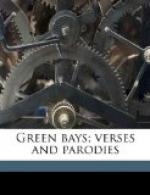Of the rose that I begged from your hair?
When you turned, and I saw something glisten—
Dear Kitty, don’t frown; it was there!
But that idiot Delane in the middle
Bounced in with ‘Our dance, I—ahem!’
And—the rose you may find in my Liddell
And Scott when you come to Commem.
Then, Kitty, let ‘yes’
be the answer.
We’ll
dance at the ’Varsity Ball,
And the morning shall
find you a dancer
In
Christ Church or Trinity hall.
And perhaps, when the
elders are yawning
And
rafters grow pale overhead
With the day, there
shall come with its dawning
Some
thought of that sentence unsaid.
Be it this, be it that—’I
forget,’ or
’Was
joking’—whatever the fem-
-inine fib, you’ll
have made me your debtor
And
come,—you will come? to Commem.
OCCASIONAL VERSES.
ANECDOTE FOR FATHERS.
Designed to show that the practice of lying is not confined to children.
By the late W. W. (of H.M. Inland Revenue Service).
And is it so?
Can Folly stalk
And aim her unrespecting
darts
In shades where grave
Professors walk
And
Bachelors of Arts?
I have a boy, not six
years old,
A sprite of birth and
lineage high:
His birth I did myself
behold,
His
caste is in his eye.
And oh! his limbs are
full of grace,
His boyish beauty past
compare:
His mother’s joy
to wash his face,
And
mine to brush his hair!
One morn we strolled
on our short walk,
With four goloshes on
our shoes,
And held the customary
talk
That
parents love to use.
(And oft I turn it into verse,
And write it down upon
a page,
Which, being sold, supplies
my purse
And
ministers to age.)
So as we paced the curving
High,
To view the sights of
Oxford town
We raised our feet (like
Nelly Bly),
And
then we put them down.
’Now, little Edward,
answer me’—
I said, and clutched
him by the gown—
’At Cambridge would
you rather be,
Or
here in Oxford town?’
My boy replied with
tiny frown
(He’d been a year at
Cavendish),
’I’d rather dwell
in Oxford town,
If
I could have my wish.’
’Now, little Edward,
say why so;
My little Edward, tell
me why.’
‘Well, really, Pa, I
hardly know.’
‘Remarkable!’
said I:
’For Cambridge has her
“King’s Parade,”
And much the more becoming
gown;
Why should you slight
her so,’ I said,
‘Compared with Oxford
town?’




